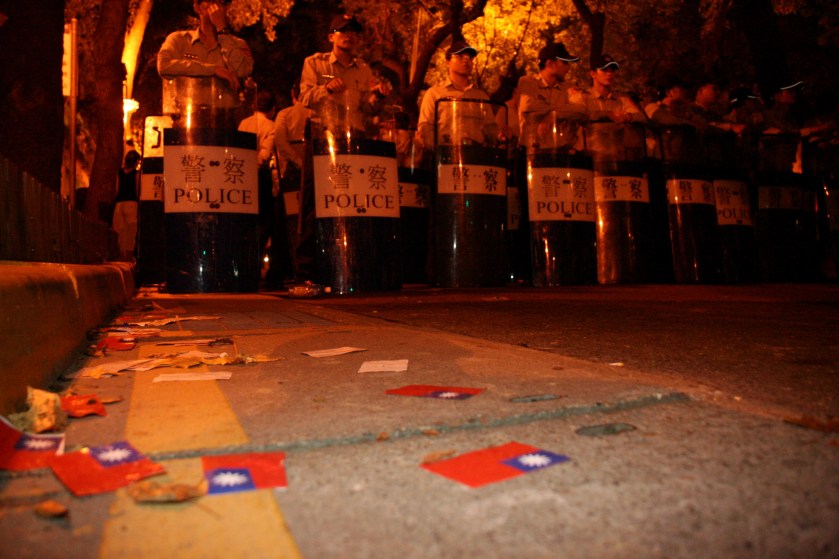Written by Yu-tzung Chang.
Image credit: 被國民黨棄如敝屣的國旗 by tenz1225/Flickr, license CC BY-SA 2.0
Taiwan’s national identity conflict (unification vs independence) is gradually subsiding, and instead of being replaced by a conflict over national sovereignty (the Republic of China vs Taiwan). Xi Jinping’s call for a “one country, two systems” formula for Taiwan in early 2019 undermined the “1992 Consensus” (one China with each side having its own interpretation) that the Kuomintang (KMT) had long upheld, weakening its attraction to voters. Subsequently, the Democratic Progressive Party (DPP) was able to come back from its disastrous defeat in the 2018 local elections, securing landslide wins over the KMT in the presidential and legislative elections of 2020. The DPP followed up with a campaign to recall Kaohsiung mayor Han Kuo-yu. On June 6, 2020, voters in Kaohsiung overwhelmingly approved the recall, with 940,000 votes in favour. Han Kuo-yu became the first major politician in Taiwan to be successfully recalled.
Many people have begun to worry that as with the Liberal Democratic Party in Japan, the DPP will hold power for a long time in the future, and Taiwan will become a dominant one-party system. There are three reasons why I think this is unlikely. First, although the national identification cleavage has waned, new controversies are continually emerging, including same-sex marriage, health insurance premiums, and environmental protection, making Taiwan a typical pluralistic society. Politicians must find ways to bring together various “minority views” and assemble a “majority force” to win elections. For example, the KMT’s landslide victory in the 2018 local elections was not only due to Han Kuo-yu’s diehard supporters and party supporters of the KMT. It was also due to a large group of people who were disappointed and dissatisfied with the DPP’s performance in government and eventually chose to vote for the KMT.
Similarly, the DPP’s landslide win in 2020 did not just rely on dark green supporters, but also many people who were voting against Han Kuo-yu (or infighting within the KMT). Taiwanese voters tend to form a “negative partisanship” that influences the outcome of elections in Taiwan. Without negative partisanship, it is impossible to explain the significant “pendulum effect” in the three elections of 2016, 2018, and 2020. Political and social forces in Taiwan are becoming increasingly pluralistic, and elections are also becoming increasingly uncertain. There is no such thing as a permanent ruling party or a permanent opposition party. The outcome of elections depends on the efforts of political parties and avoiding major mistakes.
Secondly, the primary source of “negative partisanship” is the ruling performance of incumbent parties, along with the qualities and performance of major politicians. The rational calculation of voters has replaced traditional “positive partisanship” (party identification). Milan W. Svolik of Yale University carried out an interesting experiment, finding the voters with moderate positions voters punished political leaders more severely than voters on either end of the spectrum, in particular when politicians go back on campaign promises. Similarly, in the case of the vote to recall Han Kuo-yu, voters who strongly identify with Han Kuo-yu will not question Han Kuo-yu’s reneging on his commitment to Kaohsiung to run for president or his luxury farmhouse. They will not blame Han for failing to attend interpellation sessions at the city council. However, moderate voters are different. Their wish to hold Han Kuo-yu accountable is no less than pan-green supporters. Similarly, if the DPP performs poorly in the future or there is a major corruption scandal, moderate voters will teach the DPP another lesson, as they did in 2018.
Third, although the KMT’s strength is waning, the party will not disintegrate completely. The quasi-Leninist party-state system established by the KMT in 1950 still provides the KMT with its most important source of votes. The KMT’s primary sources of support still include retired public officials — including military and teachers — long-established social groups (such as the National Women’s League, China Youth Corps, and various professional associations), and local factions. In recent years, the DPP has put forward significant policies to reform the party-state system. For example, they suggest confiscating the assets of the National Women’s League and China Youth Corps, nationalising irrigation associations, and restructuring farmers’ associations. However, these reforms have encountered stiff resistance. Moreover, the link between these organisations and the KMT has not yet been completely severed. Such individuals were long beneficiaries of the party-state and remained the KMT’s underlying supporters. As the party-state system gradually disintegrated after the democratic transformation, these individuals found themselves marginalised. They are extremely dissatisfied with the DPP and worried about Taiwan independence and the demise of the Republic of China. Peter A. Hall of Harvard University and Noam Gidron of the Hebrew University of Jerusalem published an article in Comparative Political Studies showing that feelings of social marginalisation can explain support for non-mainstream politicians or parties. This phenomenon is also found among the diehard supporters of Han Kuo-yu and explains why they are unlikely to disappear soon.
The KMT still plays a major role in keeping the DPP in check, and they still have a potential star of the future in Hou Yu-ih. Hou Yu-ih has a very high approval rating in New Taipei City and represents the KMT’s pragmatic and moderate wing, making him a serious competitor to the DPP in the future. However, the election of the KMT chairman next year will be the most critical factor in the future unity of the KMT. Hou Yu-ih was previously targeted for recruitment by the DPP, and his political positions are a long way from deep-blue supporters. If the diehard supporters of Han Kuo-yu insist on putting Han forward to run for party chairman, the KMT may be in danger of splitting.
Yu-tzung Chang is a Professor and Department Chair, Department of Political Science Associate Dean, College of Social Sciences, National Taiwan University. This article is part of a special issue on President Tsai’s second term.

